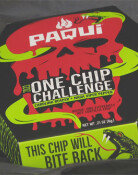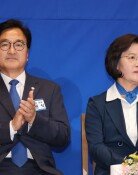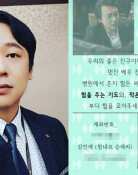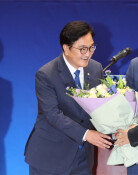Some Civic Organizations in Vanguard of Smear Campaign
Some Civic Organizations in Vanguard of Smear Campaign
Posted June. 29, 2007 03:53,
On June 28, the Liberty Union released a book on the types of malicious propaganda and the problems involving civic groups which utilized propaganda in the run-up to the 2002 presidential election. Law professor Jeong Seung-yun of Busan National University wrote a book entitled, Civic Groups & Political Maneuvering. And former student activist Lee Dal-won, who works for the Liberty Union and runs his own company, Kyungrim R&C, wrote a book entitled, Co-failure, Civic Groups & the Participatory Government. The two authors combined their books into a single volume, which is entitled Civic Groups, are they a hope or a drag? The Liberty Union came into being in 2004, claiming to stand for a new rights movement and setting its ideology as 21st century-style liberalism. Its president is Shin Ji-ho, executive director is Hong Jin-pyo, and Choi Hong-jae is a member of the steering committee; all of whom were student activists in the 1980s. Professor Jeong says in the book Negative campaigning, an election strategy which shows opponents weak points, is different from malicious propaganda, which is the blatant telling of lies. In the 2002 election some civic groups acted as a vanguard for political maneuvering.
Kim Dae-up-style propaganda functioned in four steps-
Professor Jeong said Malicious propaganda in the 2002 election was carried out in four steps.
The first step: spreading rumors through the Internet and minor news outlets; the second step: political parties and civic groups making rumors appear real and affecting public opinion; the third step: collective hypnosis meaning some mainstream media report rumors as established fact; the fourth step: civic groups aggressively incite voters.
According to the professor, the Kim Dae-up scandal started when an Internet website began reporting whatever Kim Dae-up said. The then Millennium Democratic Party criticized the then GNP candidate Lee Hoi-chang over 249 times, citing the report and even forming a sub-committee for investigating Lees sons draft-dodging allegation. The allegations grew when some newspapers and media reported their suspicions. From July 2002, the People`s Solidarity for Participatory Democracy and the Peoples Democratic Reform Association (PDRA), along with Kim, politicized the issue by holding press conferences in order to encourage a full investigation.
After the election, Kim was sentenced to 22 moths in jail on libel charges. The Supreme Court ordered Kim and the media and newspapers that reported Kims statements to pay 160 million won in damages to the GNP.
Professor Jeong said Netizens who spread the rumors were punished for their actions but the PDRA, which supported Kims claim and amplified the rumors, went unpunished. After the case was closed the group disappeared and its members are in the current government.
Lee Chang-bok was President of the group and was nominated by the Uri Party to become the governor of Gangwon Province. Pastor Lee Hae-hak and Buddhist monk Hyorim were co-executive directors of the group and they later became members of the National Human Rights commission of Korea. Kim Man-heum was a member of steering committee of the group and later became a member of the National Human Rights commission of Korea, too.
They are at it again-
Professor Jeong said in a telephone interview, Those who led the PDRA are trying to influence this years presidential election by forming the Religious Association for reconciliation of the Korean People and Unification. This group insists that the overall ruling camp should field a single candidate. It even decided to write a book to influence the election.
Lee Dal-won said, Candidate verification for Lee Myung-bak and Park Geun-hye, which is being pushed for by the overall ruling camp, is similar to the candidate verification of the 2002. This is because they learned from the last presidential election. Accusations regarding former Seoul mayor Lees asset management company, BBK, and real estate speculations were first raised by some media and then the overall ruling camp, based on the accusations, attacking the candidate.
Regarding this matter, Professor Jeong said, Civic groups want to get involved with smear campaigns because they know they will not be punished for their involvement.
Those who spread malignant rumors should pay punitive damages. Those who violate laws regarding the presidential election should face stern measures. And the public, who are the victims of those rumors, should be able to claim for compensation, Jeong said
Some civic groups are a mouthpiece of the government-
Lee criticized in his book that civic groups were inconsistent in their behavior toward the government. He said civic organizations were lax on their criticism and monitoring of the government. And at the same time, they either participated in or sympathized with the government. Civil groups keep silent about JU Groups raising of slush funds and political lobbying, and the gambling scandal involving Sea Story, which ruined some peoples lives via gambling addiction.
Following the book Civic Groups, are they a hope or a drag? the Liberty Union plans to publish a series of books on biased broadcasting and problems of blogs in elections. It will check on the part civic groups will play in the upcoming election in December.
President Shin Ji-ho of the Liberty Union said, We need to do this in order to prevent civic groups from distorting public opinion as they did in the 2002 election. We want to let civil organizations know that if they participate in smear campaigns by holding debate sessions and mobilizing people, there will be legal consequences.
ditto@donga.com







